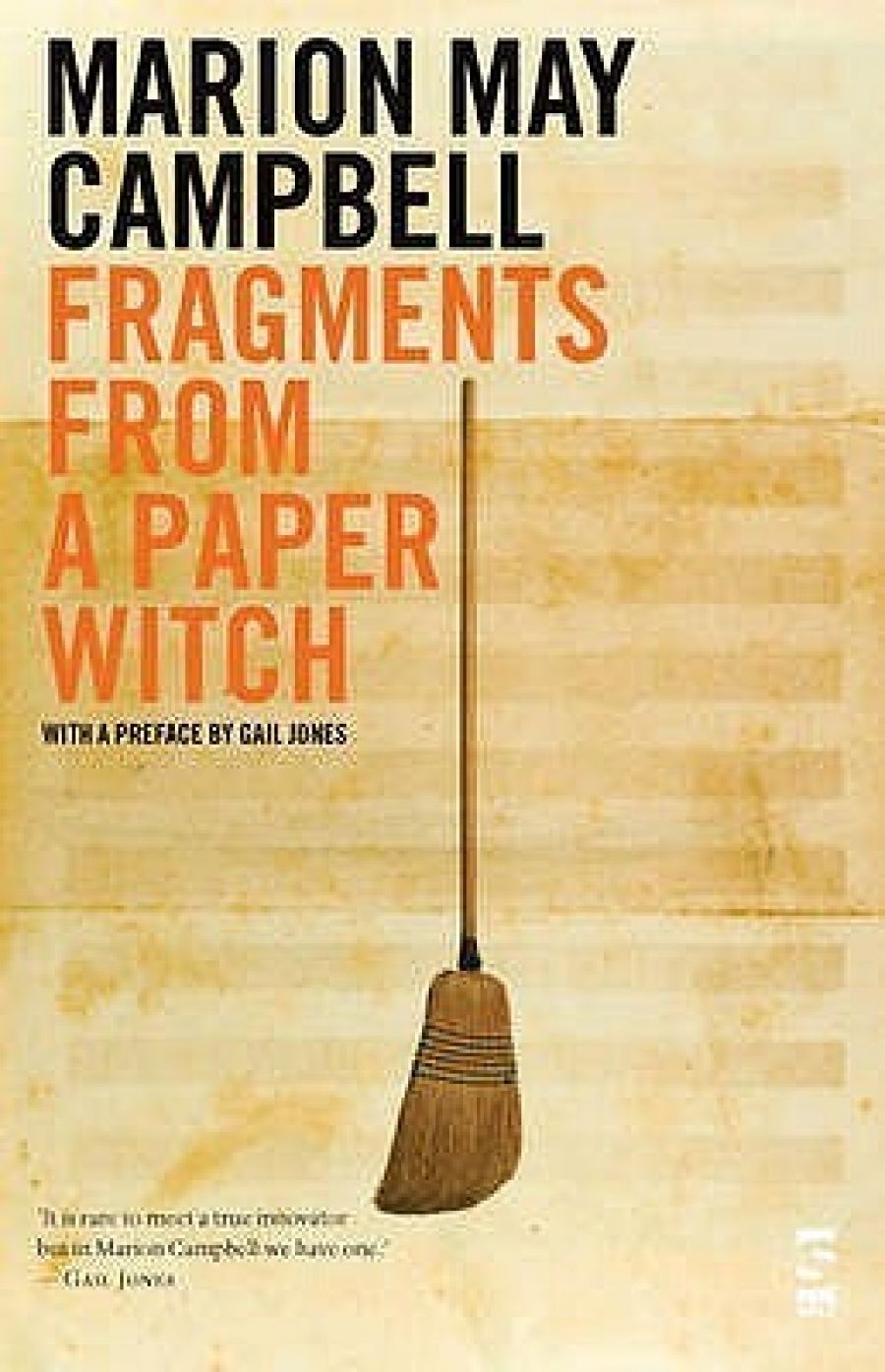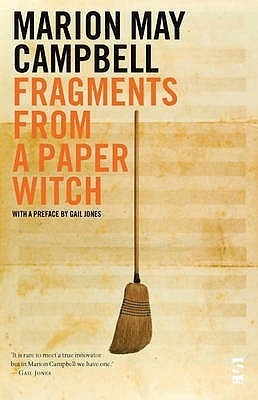
- Free Article: No
- Contents Category: Poems
- Review Article: Yes
- Article Title: Horizontal vertigo
- Online Only: No
- Custom Highlight Text:
The last thing Marion May Campbell is, is laid back. From the beginning she has been a writer high on etymology, delirious with the possibilities of form and narrative, peculiarly subject to what Genet described as the ‘horizontal vertigo’ of writing. In her novels Lines of Flight (1985), Not Being Miriam (1988), Prowler (1999) and the most recent, Shadow Thief (2006), she has displayed a constitutional aversion to the more sociological approaches to literary art. Realism, in other words, is not for her. More than anything, it is language itself that has been Campbell’s subject.
- Book 1 Title: Fragments From a Paper Witch
- Book 1 Biblio: Salt (Inbooks) $35 hb, 164 pp
- Book 1 Cover Small (400 x 600):

- Book 1 Cover (800 x 1200):

This is evident once again in this richly varied collection of prose poems, verse poems, fictocritical essays and a theatre script, not always fragments in themselves, but presented as fragments, perhaps, of an intense life in writing. It is no surprise that Campbell should be attracted to the fragment, always a sign of Romantic passion and aesthetic revolution. In writing, fragments are a serious affront to all ideologies of closure and totality. They are unsettling in their evocation of ruins, hence their attraction for modernist poets such as H.D. and T.S. Eliot. Fragments mock, in form and content, the material edifices of the state. They commemorate human failure. They also carry their own air of mystery: what kind of wholes might these fragments have belonged to? What drove the writer to start, or break off, there? Imagine the rest of those Sappho poems!
The other significant attraction of the fragment is its homology of everyday life, a kind of deeper realism, because Campbell sees the world as a ‘scattered accident’, and life made up of accidental encounters. But it is language that somehow reminds us of this, with its ability to slip and slide, and to signify in unplanned, accidental ways. This is one reason Campbell loves Stéphane Mallarmé, the least political of poets, but one obsessed with the language and morality of chance. ‘Unnaming Maria’, which starts with the quotation from Genet about page-vertigo, is an elegiac address to the French poet, the expression of a kind of bilingual tenderness for his strange, loss-filled life. Scattered throughout these fragments are lots of jokes, too, invariably verbal ones, some of them even involuntary, including one about the clichéd denial of the fragmented self: ‘pull yourself together they say’ (‘I, of the swarm’). Languish jokes.
As a ‘paper witch’, Campbell is a writer who is dangerously attractive, with powers of dubious provenance, one who practises the magic of words. Is her intention to ensorcell or to enchant; is she a white or black witch? Both, I guess, given the material evidence of print and page. Perhaps there is also a sense in which this writer, as a witch, threatens the norms of her community, possessing her own arcane library, in this case of beloved European exemplars such as Mallarmé, Celan, Deleuze, Lacan, and published not by an Australian publisher but by Salt, the Cambridge-based publisher of global poetry.
The long central piece of this volume, ‘White Pickets and Razor Wire’, is made up of a lengthy theatre script and a short protest poem, ‘white window shopping’, the latter about the death of Louis St John Johnson in a racist attack in Perth, in 1992. Both these pieces represent Campbell’s furious outrage at injustice and her passion for human rights. The theatre piece, in three acts, ‘The Half-life of Creonite’, is a contemporary dramatisation of the Antigone and Creon story, set in an intensive care unit and nightclub. Since Sophocles and Aeschylus, this story has always been about state violence, injustice and individual conscience. From its classical origins, it always had an individual woman of conscience at its centre, alone in her fuming resistance to male authority and its public stupidity. Its motto might be the 1970s feminist banner: the problem with the world is men. The familiar ethical dilemmas of the Antigone story are translated here into a terroristic and administered world of the present, but with the extended moral insight about the half-life of tragic events. For how long do a generation’s crimes remain radioactive? In this sense, Campbell gives Tig’s (Antigone’s) story a disturbing Australian relevance.
This collection opens with another mythographic piece of writing, the prose poem ‘A for Ariadne’, in the voice of the abandoned heroine, and linked to an historically variable thematic in this collection about female experience, one of the most striking of which is ‘Spectacular Motherhood,’ about pregnancy and birth. This piece is by turns intense, hilarious, theoretical, surreal and occasionally almost unbearable. The insights, as here, about ultrasound technology, are both brilliant and troubling: ‘Pregnancy becomes an externalised series of events caught in freeze frames: a multiplication of shadowy images which only those with advanced diplomas can read. Nevertheless, the mother is given souvenir pictures to take home.’
Campbell is somehow able to write with equal attention on experience and the language of experience. This has something to do with her respect for and fascination with the unconscious and dreams, the places where language reveals its private lives. ‘Ardour’ is the word Gail Jones picks out in her helpful preface to this book, as characterising Campbell’s writing. It is exactly right, too: pun-sounding, not in everyday use, and so we keep looking at it as a word, wondering about its not quite familiar but seductive meanings. Like all of Marion May Campbell’s writing, it is a fragment of bewitching language; of an effulgent spirit.


Comments powered by CComment